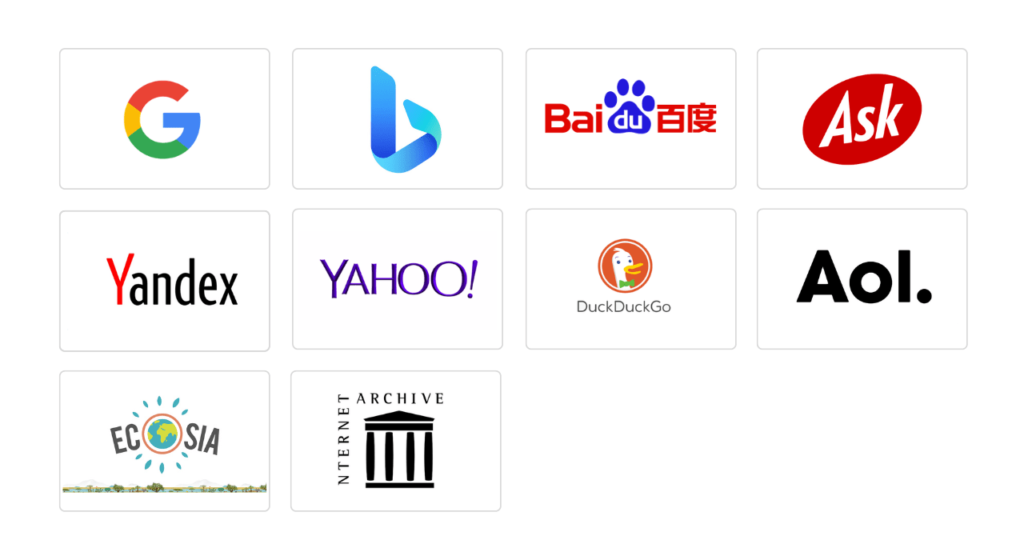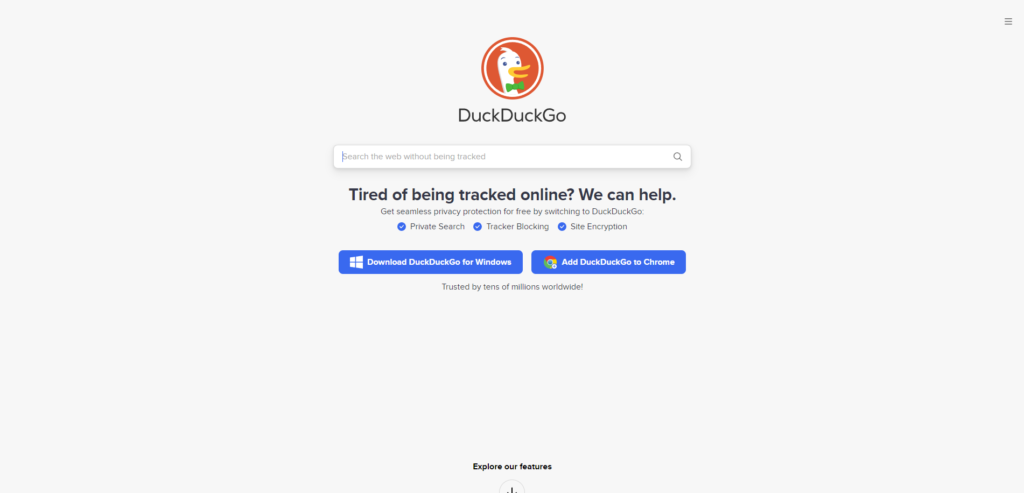If you are anything like me, you are always interested in finding the best options for securing your privacy online. It is not always an easy task. Every day new technologies are entering the marketplace and simultaneously other older technologies are becoming obsolete. It can be a daunting task to keep up with the pace of technology and the internet at large. You may also be facing the all-too-common issue of information overload. Every marketing agent in the world is vying for your eyes on their product. Well, when it comes to finding the best search engine you’re sure to find volumes of information online… I would venture to say that finding information on the best search engine for privacy is an altogether more difficult task.
Search engine privacy and security
Most people are not thinking about privacy and security when browsing the internet. They simply do whatever comes the easiest. In most cases, users will just load up the first browser that they find and start using the default search engine.
That means, from a business standpoint, most of these companies do not need to advertise or even be particularly clear about their privacy policies. All they have to do is make sure that they contract with the right partners to make sure their search engine shows up when you launch your browser. Google in particular is a master at this.
Partly because they were early to market in the search engine game.
Partly because Google is just good at what they do…
How to choose a search engine
What search engine do you see pop up most often when opening your browser? Did you set it, or did it come set by default? Have you ever considered what browser you have, or did you just look at your phone to check? Hmm…
What search engine do you see pop up most often when opening your browser? Did you set it, or did it come set by default?

Have you even considered what browser you have, or did you just look at your phone to check? Hmm…
This makes for an interesting situation when searching for better search engine alternatives. Most of these companies don’t really have to sell themselves or convince you that their solution is best. They don’t really have “websites” where you can visit and learn more about the companies. Search engines like Google, Bing, and Yahoo can rely on market share, usability, and ignorance to convince people to use their products without making any promises or specifying how they use your information.
So let’s dig a little into the history of search engines. We’ll figure out what they do and why they do it. We’ll uncover the promises, both spoken and unspoken, these companies deliver. And finally, we’ll see if we can figure out which search engines out there actually protect your personal privacy.
So what is a search engine exactly?
Simply put, a search engine is a software program that helps users to search the internet. You can think of it like an online directory or a phonebook. The user types in the name of the company, or some answer that they wish to find. The search engine scans the directory listing and tries to accurately determine what it is that you are looking for.

Image source: Reliable Soft
Technically speaking, the search engine constantly ‘crawls’ the internet, searching for changes and updates to websites, including recently published websites. Not only does the search engine look for website domain names, but it also searches those websites content. Then it tries to determine the purpose of the website.
For example, before launching personalprivacyonline, if you did a search for it on any search engine, you would not have found any results related to this site because it did not exist yet. However, after launching the site, the search engines picked up on my domain name. Then the search engine added it to the listings in their directory.
Now if you search that exact term, the search engine should be smart enough to match your search with my result. But like I said, that does not just apply to the domain name. It also applies to the content of the website. Users expect to search for specific content, have the search engine collect data on all sites referring to that content, and receive the most relevant results.
TO RECAP:
A search engine is a software tool that lets users search the internet! First the user types in a description of the content that they wish to find. Then the search engine then uses its vast index of websites and content to return the most relevant results to the user.
How do search engines make money?
This is an interesting question and one I like to ask myself about any software service that I use.
How does it make money?
Free Search Engines
First, we should start by saying that search engines (at least all that I know of) are ‘free’. I put that in quotes because, as I like to remind my audience, nothing in life is free. And if it is free, then you are probably the product. That is definitely the case here.
One of the ways companies who make search engines are able to release them for ‘free’ is because they monetize by selling ad space. As I mentioned before, when you search for anything on the internet, there are thousands of companies vying for your eyeballs. Companies are able to pay the search engine company a fee to return their results as ads, which are usually served up before the organic results.
Search Engines Selling Data
Another, more devious way, that these companies may monetize is by directly selling your data to advertisers. They may do their best to disguise this action as anything but selling your data, but when they provide a company with geo-location, IP information, or search history for advertisers to bid on for advertising purposes in return for a fee, then this is called selling the data, regardless of whatever legal terminology they are hiding behind.
That’s not all, though. Once these companies have your data they can use it for whatever means they want. They can use it to generate a digital avatar of you containing your behavioral patterns, like where you like to go, where you like to shop and eat, and even what your favorite show is. Then they can turn around and do whatever they want with this data behind closed doors.
This is all quite a large problem because when you go to use a search engine, there is no clickthrough agreement and no signup form. They are just able to start collecting your data and doing what they choose without your knowledge. In 2023, don’t you think that you should be allowed to search the open web without having to worry about your search engine tracking you across sites and gobbling up your personal data? I think so, and that’s why there’s got to be a better solution.
What are the most common search engines?
Google Search Engine History
Google’s search engine was early to market and rapidly gained market share, currently accounting for 92% of web searches online. They are truly the “big gun” in terms of search engines. They are so popular in fact that I would wager to guess most people don’t even realize that there are other options out there.
Having been around the longest, the Google search engine has quite a few things going for it. First and foremost, Google’s search results tend to be the most accurate. While there isn’t much hard data to support this claim, it has been experientially confirmable. There have been quite a few times that while searching for one item or another, I will opt to switch back over to Google if I cannot find the results I am looking for. Some search engines, such as the Brave Search Engine, even offer a Google Fallback option for when the results they return are either too few or not high enough quality.
Google Search Quality
Google has also done an excellent job building out its algorithm over time. From their website you can see that they put a huge emphasis on the meaning of your query, the relevance of the webpage, the quality of content, usability of the webpage, as well as context. With a large infrastructure to support R&D, as well as a focus on finding only high-quality content, Google tends to consistently deliver high-quality results.
Another great thing about Google is its speed optimization. According to Google’s “philosophy”, speed is an important factor in their business model as a whole. With the mantra, “Fast is better than slow,” you know that speed is a staple of the Google search brand. You will almost always get thousands of search results without ever experiencing a loading bar or a slow-loading page. Not that other brands aren’t competing in terms of speed, but Google maintains a specific focus in this area, and the results are clear when using the search engine.
Google Search Privacy Concerns
As you might expect, this search engine comes with some pretty hefty privacy concerns. First, Google uses third-party cookies(small bits of code added to your system or device to track your different activities over time). Essentially this allows the owner of the tracking cookie to create a history of your searches, which they can use how they see fit. Often times the tracking cookie generates ‘personalized results’ for you based on your previous search history.
Most notably in recent history, Google has been in the news regarding lawsuits. These lawsuits allege misuse of their location tracking information and cookies. They have released numerous statements in the last several years claiming to fix these concerns. From phasing out the use of cookies to updating their terms of service and privacy policy. Still, many users have been left with a feeling of unease as the background use of information has begun to be revealed publicly.
Bing Search Engine History
Bing is the search engine offered by Microsoft. The fact that it only accounts for 3.04% total market share among searches (4.43 if you add in Yahoo’s results) really shows how much of a stranglehold Google has on search globally. However, that 3.04% is more than most could muster. Bing isn’t Microsoft’s first attempt at getting into search. As a matter of fact, they started developing search with MSN search back in 1998. About ten years later, after having undergone a few major changes, the modern iteration would eventually emerge having rebranded itself as Bing.
After the Bing rebrand, things really started to take off for the search engine, and by 2011 it had peaked with 26.5% of all searches being performed by their engine. However, this did not last, and eventually, Bing started to decline while Google began to eat back up market share. By 2018, Bing only had 4.58% of the market share left, and that number continues to decline.
Bing Search Quality
With Bing, you have another big search engine with a lot of weight behind it. Microsoft’s team is nothing to scoff at… They have about as much power as you get in the tech industry. They can make changes and enhance their search results and capability with ease. You would think with all of that power, they would be able to bring about a highly competitive offering. But Bing has been criticized for being “slower to index websites” than Google, and for sometimes failing to crawl and index some websites at all. They have also received criticism for using Google’s search results directly, but Microsoft has denied the allegations.
From the privacy angle, there is also quite a bit to be concerned about with Bing. They fall short in a few key areas like adding tracking cookies and ip address tracking. There are also allegations of information sharing, but the veracity of those claims is not confirmed.
Yahoo Search Engine
Coming in third in market share is the Yahoo search engine. Ironically, Yahoo currently uses search results from Bing to power its own search engine. That means that the results you receive are going to be coming straight from Bing. Not from anything specifically proprietary to Yahoo. That basically means that everything I said above about Bing search also holds true for Yahoo search. So even though it comes in high on market share, and is an individual property, it is not really its own entity.
What is the best search engine for privacy?
So where does all of this leave us? The primary option available is Google, with Bing as a “close” second, but both of these offerings suffer from the same failings. They are both lacking from a privacy and security perspective. They engage in unhealthy tracking practices and advertising policies. It is also often unclear how they are using the information that they are gathering from you. Therefore, if you want the best search engine for privacy you will only be able to come to one conclusion in 2023. That solution is DuckDuckGo.
Let me introduce the DuckDuckGo Search Engine
What is DuckDuckGo? At only .63% of the market share (but steadily rising), DuckDuckGo is a search engine with a privacy focus at the center. That means that they put their time, effort, and resources into protecting user data and making sure that you are the only one who has access to your search results. This frees you up to search the internet without worrying about ads from your search history following you around from site to site. But escaping creepy advertising trackers isn’t the only benefit. You will also benefit from smarter encryption policies. Automatic SSL enforcement, access to specific privacy settings, and robust metrics to name a few. Simply put, this search engine has all the features you expect, without the tracking activity.

So what’s the downside you may ask? Well, I won’t lie and say that everything is perfect because it’s not. DuckDuckGo hasn’t been around for as long as its competition, and they are a growing company, which means that its search engine and algorithms are not as advanced as Google’s. This can result in sometimes getting less than perfect results.
The workaround I personally use is that I default everything to DuckDuckGo, and then in times when I don’t find what I need, I will just use Google as a fallback. Google is a flawed solution, but don’t hamstring yourself to avoid it. That is also not to say that DuckDuckGo’s results are always lacking, because they certainly are not. Most of the time I find exactly what I need, and the algorithm seems to be improving every week. As the company gains traction and market share, I would expect this to only get better and better over time.
How DuckDuckGo’s monetization strategy is different?
Googles monetization strategy
You can’t talk about search engines without mentioning monetization strategy. Both Google and DuckDuckGo make money from advertisements because that’s essentially the only way to keep search-free for users. If they did not do this, then the internet would be a much different place where everyone had to pay to use a private search service. However, the implementation of this advertising model for each company is quite a bit different.
With Google, you can expect a process something like this. You input your search into the engine and are returned generally with paid advertisements first if there are relevant ads to place in the results. After the ads, you see the top non-advertisement related results.
The results don’t just stop there.
Once you’ve entered a search into Google and you start going to other websites, that search data can be passed along to other webpages that also use Google’s advertising system. When you go onto a completely different site, you may start seeing ‘results’ or follow-up ads on those sites too. This is Google trying to display ads relevant to you, but this is quite a privacy-invasive tactic. For the general public, this can also prove problematic. Perhaps you just wanted to search or do research. Now you have a product you didn’t want or need following you around the internet trying to get you to buy. All of this can make for quite an uncomfortable situation.
DuckDuckGo’s monetization strategy
DuckDuckGo does advertising differently.
I couldn’t find specific data on this, but generally speaking, when you do a DuckDuckGo search you’ll be presented with the most relevant search results first. I don’t think at this point they allow any direct site advertising. This helps to keep your search results pure and makes sure you dealing with accurate results from a fairness perspective.
The way DuckDuckGo does make money is by showing ads for Amazon and eBay. If you go to the shopping tab or just search for a product DuckDuckGo pulls in the most relevant data. If that data is from one of the above providers they’ll display the product. Then if you buy from either site DuckDuckGo will get a commission from displaying the ad or item. This is a simple and straightforward process. While it’s still ad or marketing-related income, the ad stops at the search results that you requested. This means the ads will never follow or track you into other sites or search results.
How do you make the switch to DuckDuckGo?
Switching to a more secure and private search engine solution is an important piece of the personal privacy roadmap. Search is an essential tool and something that many use often in their daily lives. Opting into solutions that protect your data and privacy is a must. If you don’t, you’ll be followed around by invasive tracking features. If you’re like me, though, you may be hesitant to make the switch… You may not even know how to get started. Here’s a small outline to help you get started:
Just like anything, the first step is to dive in and try it. You can start by going to DuckDuckGo.com now and giving it a test drive. Search anything and see if it works for you.
DuckDuckGo Setup
If you think DuckDuckGo is for you the next step is to change your homepage and search engine to default to DuckDuckGo. Making this change on a single device will suffice. I use my phone to search the most so that may be a good place to start.
By switching the default mechanism you’ll be moving most of your traffic off of Google’s servers and onto DuckDuckGo. You’ll be using a more private service without even thinking about it. Then, if you run into a scenario where you cannot find what you’re looking for you can manually go to Google. This creates using Google’s services as a very intentional activity and removes it from your automated day-to-day processes. At least when you switch over you are manually opting in each time to that service. Then after you find what you need just go back to using DuckDuckGo. I’d say that the times when I need to use this methodology are very rare, but it’s useful in a pinch.
Then once you’ve moved over your first device and you start to get in a groove you can begin to switch over other devices. You laptops, tablets, phones, pc or whatever you use for browsing. You can rest safe knowing that your search data is secure and will remain private and only be used in the way in which you intended. If you’re ready to make the switch I have another article here showing how you can set up DuckDuckGo on any device.

